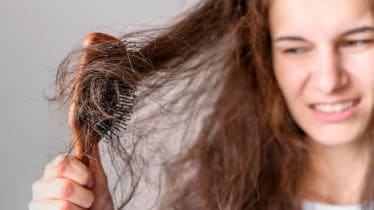If you’re in your 20s or 30s and already noticing hair thinning or hairfall, you’re not alone. Hair loss is no longer something only older people face. In fact, many young Indians—both men and women—are struggling with hair problems, and experts say our daily lifestyle habits are a big reason why.
A 2024 study published in the International Journal of Trichology found that over 90 per cent of Indian women with hair thinning also showed signs of advanced hair loss and underlying health conditions like PCOS and high cholesterol. Another study by Krupa Shankar, also in the International Journal of Trichology, found that 58 per cent of Indian men aged 30–50 were already showing signs of male-pattern baldness. But why is it happening?
1. Hormonal health and hair loss
Hormonal issues such as PCOS and thyroid imbalances are among the most common reasons behind hairfall, especially in young women. Many only discover these conditions after noticing unusual hair thinning. These issues need proper medical care—not just shampoos or oils.
2. Lack of physical activity
Regular movement boosts blood circulation, supports hormonal balance, and supplies oxygen and nutrients to hair follicles. A sedentary lifestyle, on the other hand, can lead to poor scalp health, excess oil or dryness, and dandruff—all of which worsen hair loss.
- Aim for at least 30 minutes of daily activity—like walking, yoga, or cycling.
- Avoid sitting for long hours without breaks.
- Over-exercising or extreme workouts may also disrupt hormonal balance—so moderation is key.
3. Your diet reflects in your hair
What you eat plays a major role in your hair health. Hair is made mostly of protein (keratin), so protein deficiency can weaken it. A poor diet low in iron, zinc, and vitamins like D and B12 can lead to hair thinning and brittleness.
- Eat a balanced diet rich in protein (dals, eggs, lean meats), green leafy vegetables, fruits, nuts, and seeds.
- Cut down on processed foods and sugar, which can trigger inflammation and hormonal issues.
- Avoid crash diets and binge-eating cycles—they disrupt nutrient intake and stress the body.
4. How you treat your hair matters
Many daily hair habits actually do more harm than good. Constant heat styling, tight hairstyles, and rough combing put pressure on hair follicles and make hair weaker over time.
- Be gentle while brushing or styling your hair.
- Limit the use of heat tools like dryers, straighteners, and curlers.
- Don’t tie your hair too tightly—especially in high ponytails or buns.
- Keep your scalp clean by washing regularly with a mild shampoo.
5. Stress and sleep
Mental health plays a big role even when it comes to hair health. Chronic stress raises cortisol levels and can lead to telogen effluvium—a condition where hair sheds more rapidly than usual. Poor sleep has a similar effect on the body’s recovery and hormone levels.
- Try stress-reducing habits like meditation, journaling, or simply stepping away from screens.
- Make sleep a priority—aim for 7–8 hours every night.
- Don’t underestimate the power of rest for your overall well-being.
